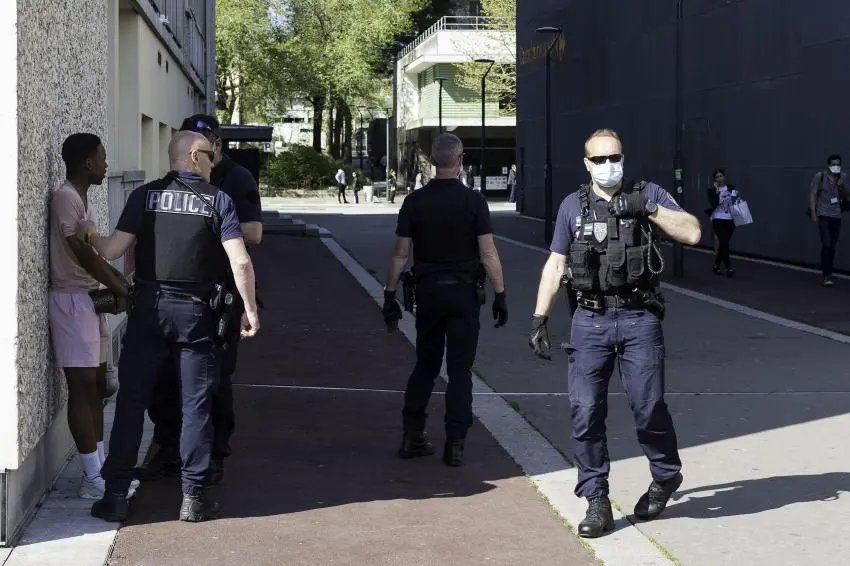France
France’s Police Racism: A Call For Global Scrutiny

France’s Police Racism:
The heartbreaking story of Nahel M.’s murder highlights France’s rising police brutality against Black youngsters. A 17-year-old North African named Nahel was another victim in a horrific sequence of police traffic encounters that killed at least 15 people in 2022.
Police violence has increased due to the 2017 public security statute, which drastically extended police use of force. The aftermath has shattered communities and reinforced a dangerous practice of excessive and fatal force against Black people.
The Veil Of Denial: France’s Refusal To Confront Systemic Racism
France denies institutional racism in its law enforcement despite overwhelming evidence and worldwide uproar. Nahel’s murder highlights police racial and ethnic profiling as a decades-long habit.
France’s newest Anti-Racism Action Plan fails despite demands for change and accountability. The manifesto ignores racial and ethnic profiling, denying the urgent need for police structural adjustments. Denial hinders development and perpetuates Black-disproportionate prejudice.
Shifting The Narrative: From Victims To Voices
After Nahel’s death, the narrative focused on oppressed populations’ responses rather than systematic prejudice. Police-affiliated unions stigmatized and racially frightened protesters amid justified outrage and a need for reform.
This deliberate change in narrative ignores the critical need for police reform and the pervasive racism and prejudice in French society. As a significant colonizer, France must address its racial hierarchy.
As international human rights agencies examine France’s discriminatory police tactics, the world awaits action. The death of Nahel M. should spark painful talks and force France to address its police system’s racism and prejudice.
Racial Profiling And The Legal Landscape
The widespread problem of French police racial profiling requires a formal investigation. The 2017 public security bill expanded police power but fostered racial prejudice. This legislative framework has enabled race and ethnicity-based targeting, not equality.
Critics say the law’s broad interpretation of police force has fostered racial profiling. This has increased deadly police stops and sown dread and distrust in Black communities. Racial profiling must be acknowledged and its legal foundations dismantled.
As international human rights groups scrutinize France, the legislative framework must be examined. Addressing the root causes of racial profiling requires more than surface reforms. France’s readiness to update and create laws that stress equality and justice will determine its commitment to ending systematic racism.
Community Response And The Perception Challenge
The impacted communities’ reaction to Nahel’s killing highlighted the intricate interplay between systematic racism and public perception. The demonstrations demanded justice and an end to unfair police, not simply rage. These valid requests for reform were greeted with stigmatizing rhetoric that perpetuated damaging stereotypes and deepened the divide between law enforcement and underprivileged groups.
Instead of talking, police-affiliated unions declared “war” on racist fearmongering. This harsh language warped the narrative and portrayed demonstrators as “rioters” rather than systemic change agents. Such framing perpetuates unfavorable preconceptions and hinders effective transformation beyond the demonstrations.
Perception issues demand a comprehensive strategy beyond enforcement. It requires removing law enforcement prejudices and encouraging open dialogue between communities and police. France must acknowledge that impacted groups are not alone responsible for changing attitudes; it is a shared obligation that requires actual conversation and understanding.
International Accountability And The Path Forward
Accountability becomes crucial when the world scrutinizes France’s police force’s institutional racism. International monitoring is becoming more necessary as worldwide police violence led to the founding of the International Master Mechanism to Advance Racial Justice and Equality in Law Enforcement (EMLER).
This instrument, which will report before the Human Rights Council, is vital for examining France’s reaction to discriminatory police actions. The “Universal Periodic Review” suggestions must be actionable, not just formality. France’s human rights record will be tested, and the international community must prioritize transparency and systematic racism elimination.
France has a chance to change its worldwide image. Recognizing systemic racism and committing to significant changes can rectify Nahel’s terrible death and create a more fair and equitable society. The solution needs tough talks, reflection, and a sincere commitment to eradicating institutional racism in the French police.
The Role Of Economic Inequality In Police-community Relations
The interconnectedness of economic inequality is a significant concern beyond police brutality and racial profiling. Nahel’s narrative, like many others, is set in metropolitan suburbs with race and ethnicity-based over-policing and systemic economic and social inequities. Financial hardship and the fear of biased police plague these impoverished populations, mostly of race.
The relationship between police-community interactions and economic disparity is apparent. Teens in many metropolitan suburbs suffer unfavorable police interactions, limited options, and institutional impediments. The tragedy of Nahel’s murder shows that systemic racism must be addressed beyond enforcement changes. It requires targeted investments, education, and empowerment of vulnerable populations to reduce economic inequality.
France must understand the link between economic inequality and discriminatory police to solve systematic racism. Reevaluating law enforcement methods and developing structural financial solutions that empower historically oppressed communities by race and class is the way to fundamental transformation.
Read Also: Real Madrid’s Vinicius Exposes Racist Gesture From Young Fan
France’s Colonial Legacy And The Persistent Ghosts Of Racism
France’s colonial past must be confronted to unravel systematic racism. France, the world’s second-largest colonizer, established racial hierarchies in its colonies. Today, intergenerational descendants of former colonies endure racism, economic marginalization, and the effects of colonialism.
Denying racism and race in France prevents impacted groups from addressing structural issues that affect them daily. Nahel’s tragedy represents a giant fight for communities that have suffered colonial practices. France must confront its colonial past and the entrenched systems that perpetuate racial inequality.
International human rights institutions will examine France’s systematic racism in the next year, making tackling the colonial legacy a must. Dismantling systematic racism cannot be separated from France’s colonial past. Addressing this legacy is crucial to creating a society that accepts its history and strives toward a more inclusive and fair future.













You must be logged in to post a comment Login